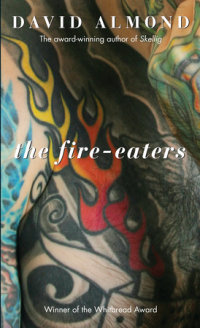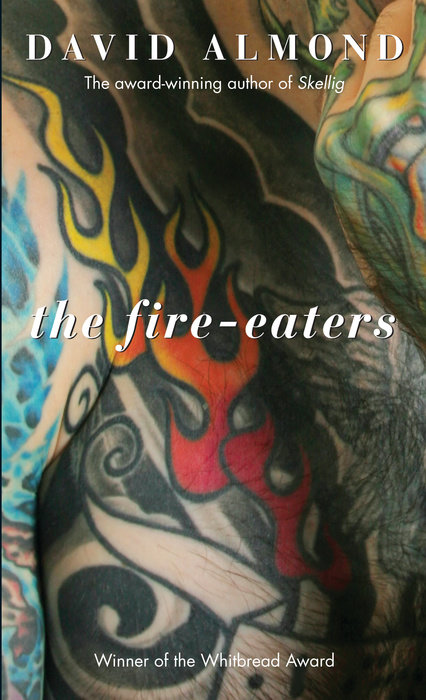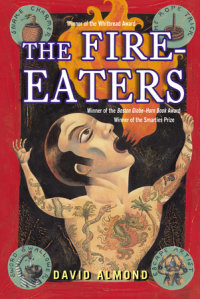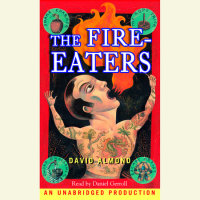ONE
It all starts on the day I met McNulty. I was with my mam. We left Dad at home beside the sea. We took the bus to Newcastle. We got out below the statue of the angel, then headed down toward the market by the river. She was all in red. She kept singing "The Keel Row" and swinging my arm to the rhythm of the song. A crowd had gathered beyond the market stalls but we couldn't see what held so many people there. She led me closer. She stood on tiptoes. There were bodies all around me, blocking out the light. Seagulls were squealing. It had been raining. There were puddles in the joints between the cobblestones. I kicked water across my shiny new black shoes. The splashes turned to dark stains on my jeans. The water splashed on her ankles as well but she didn't seem to feel it. I tugged her hand and wanted to move away, but she didn't seem to feel it.
His voice was muffled by the bodies, and at first it seemed so distant. "Pay!" he yelled. "You'll not see nowt till you pay!" I tugged her hand again. "Are you not listening?" he yelled. I raised my eyes and tried to see. And she put her hands beneath my arms and lifted me and I teetered on my toes and there he was, at the center of us all. I looked into his eyes. He looked back into mine. And it was as if my heart stopped beating and the world stopped turning. That was when it started. That moment, that Sunday, late summer, 1962.
He was a small, wild-eyed, bare-chested man. His skin was covered in scars and bruises. There were rough and faded tattoos of beasts and women and dragons. He had a little canvas sack on a long stick. He kept shoving it at the crowd.
"Pay!" he yelled and snarled. "You'll not get nowt till you pay."
Some of the crowd turned away and pushed past us as we moved forward. They shook their heads and rolled their eyes. He was pathetic, they said. He was a fake. One of them leaned close to Mam. "Take the lad away," he said. "Some of the tricks is just disgusting. Not for bairns to see. It shouldn't be allowed."
McNulty's hair was black. He had pointed gold teeth at the front of his mouth and he wore tiny golden earrings. There were deep creases in his cheeks. The bridge was high behind him. The sun shone through its arch. Steam and scents from the hot dog stalls and popcorn makers drifted across us. Mam held me against her.
"Reach into my pocket," she said. "Find him a coin."
I reached down and took out some silver. When I looked up again his little sack was right before my eyes.
"Into the sack with it, bonny lad," he said.
I dropped the coin in. He held my eye with his. He grinned.
"Good lad," he snarled.
He took the sack away.
"Pay," he yelled, shoving the sack at other faces. "Get your money out and pay!"
She pushed my shoulders, helping me forward. I squirmed through, right to the front of the crowd.
"Bonny lad!" he muttered when he saw me there. He looked through the crowd. "Bonny lady."
The stick and the sack were on the ground. He flexed his muscles. A cart wheel lay on the cobbles beside him. He stood it on end, in front of him. It had heavy wooden spokes, a thick steel rim. It was as high as his chest.
"Could McNulty lift this?" he hissed.
He took it in his hands, spread his legs, bent his knees and lifted it to his thighs and let it rest there.
"Could he?" he said through gritted teeth. "Could he?"
There were tears of strain in his eyes.
He groaned, lifted again, a sudden jerk that took the cart wheel high. We gasped. We backed away. He leaned his head back and rested the wheel on his brow so that it stood above him, with the sun and the bridge caught in its ring. He shuffled on the cobbles, balancing himself with his elbows wide and his hands gripping the rim of steel. He grunted and hissed. Then he lifted the cart wheel free and let it fall with a crash and the whole earth seemed to shake.
He glared at us. He blinked, wiped his tears away.
"See? See what a man can do?"
I reached behind me but Mam's hand wasn't there. I looked back through the crowd and saw her and she smiled and held up her hand, telling me to stay there.
"What next?" said McNulty. "The fire or the chains or the..."
He fell silent as his eye met mine again. He leaned close.
"Help me, bonny," he whispered.
He reached for my hand. I turned to Mam. She waved again and smiled, as if to tell me everything was fine, she was still there, there was nothing to fear. He cupped my shoulder and drew me to him. Dozens of eyes watched.
"This is my assistant," he said. "His name is..."
I couldn't speak. He leaned close. He cupped his hand across his mouth, whispered into my ear.
"His name is..."
"R-Robert," I stammered.
"R-Robert!" he announced.
He crouched in front of me. His skin glistened. I caught the smoky sweaty scent of him. I caught the sour smell of the river flowing darkly nearby. I looked into the black center of his eyes.
"There is a box here, bonny," he told me.
He slid a casket to my feet.
"Open it," he said.
I did nothing.
"Open it, Bobby," he whispered.
With trembling fingers, I opened it. Inside were needles and pins and fishhooks and skewers and knives and scissors, some of them all rusted, some of them all bright.
"Take out something awful," he said. "Take out the thing that you think should make the most pain."
I stared into his eyes, so deep and dark.
"Do it, Bobby," he said.
I took out a silver skewer, as long as my forearm. It had a Saracen's head as a handle. The point was needle-sharp.
He shuddered.
"Well chosen, Bobby."
He stood up. He held the skewer between his index fingers for the crowd to see.
"Who would dare?" he said. "Bobby!"
I looked up at him.
"Bobby, pass the sack to them. Tell them to put their coins in it. Tell them they'll not see nowt until they pay."
I just wanted to escape, but the bodies were packed before me. The faces were all smiles. Mam had her hand across her mouth. She widened her eyes, she raised her shoulders, she tried to go on smiling.
"Do it, Bobby," he said. "Do the buggers think a man like me can live on fresh air? Pay! Tell them! Get your money out and pay!"
I weakly pushed the sack into the crowd. McNulty barked his demands. Mam leaned far toward me, dropped three coins in. I wanted to reach out to her, grab her hand, get her to pull me away. Then McNulty snapped:
"Enough, Bobby. They're tightfisted crooks and they won't give us what we need. But to hell with them. Let's give them something to infect their waking and fire their dreams."
I turned to him. He touched my cheek. He drew me to his side. He spoke to me as if no one else existed, as if there were just the two of us there beside the river on that brightening late-summer day.
"Help me, son," he said.
He stood stock-still. He lowered his head, closed his eyes. He breathed deeply. He muttered incomprehensible words. He raised his head, opened his eyes. He held the point of the skewer against his cheek. He looked blankly at the crowd.
"Bobby," he said. "Touch me if I cry out. Catch me if I fall."



